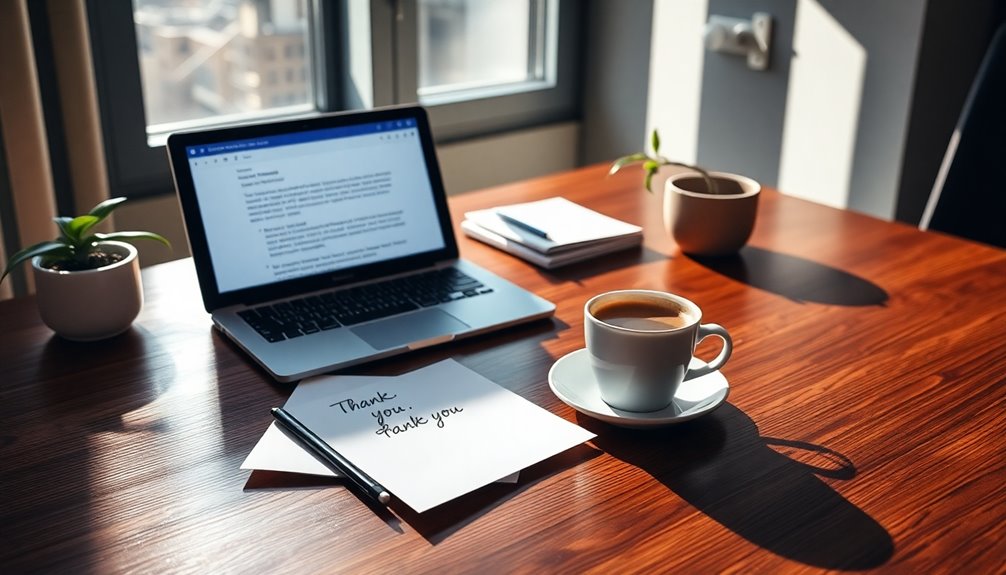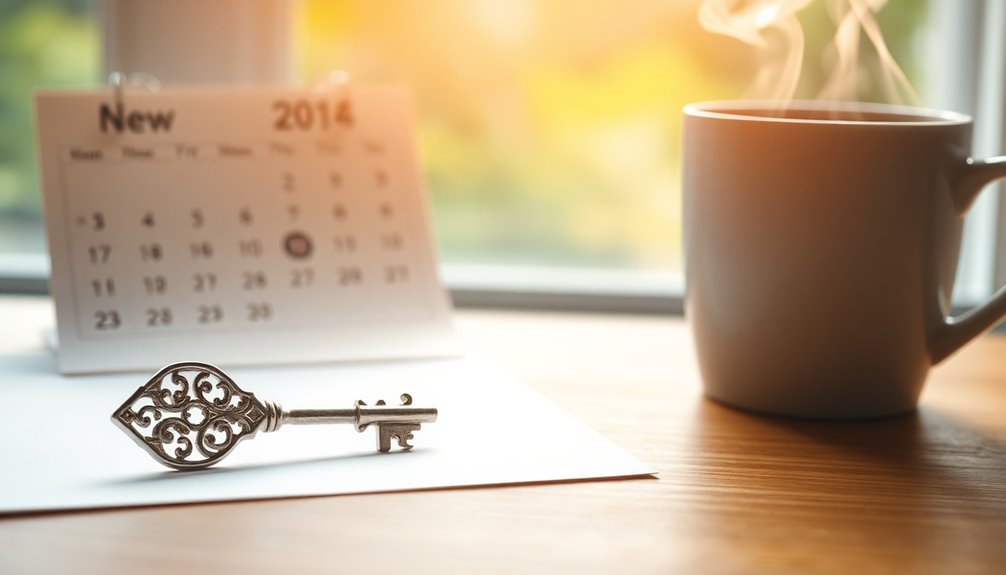Mastering the art of post-interview follow-up can set you apart in a competitive job market. Always send a thank-you note within 24-48 hours to express gratitude and reinforce your enthusiasm. Personalize your message by referencing specific topics discussed to leave a lasting impression. Keep it concise and professional, and don't hesitate to ask about next steps in the hiring process. If there are delays, remember that patience is essential, as various factors can affect timelines. Staying proactive guarantees you maintain a positive connection with potential employers, and there's much more to explore on this significant topic.
Key Takeaways
- Send a thank-you note within 24-48 hours to express gratitude and reinforce your interest in the position.
- Personalize your message by referencing specific topics discussed during the interview to create a lasting impression.
- Use a clear subject line that includes the job title for easy identification by the interviewer.
- Maintain a positive tone, and inquire about the next steps in the hiring process to demonstrate your enthusiasm.
- Be patient and manage expectations, as hiring delays are common due to various factors like multiple candidates and internal processes.
Importance of Follow-Up
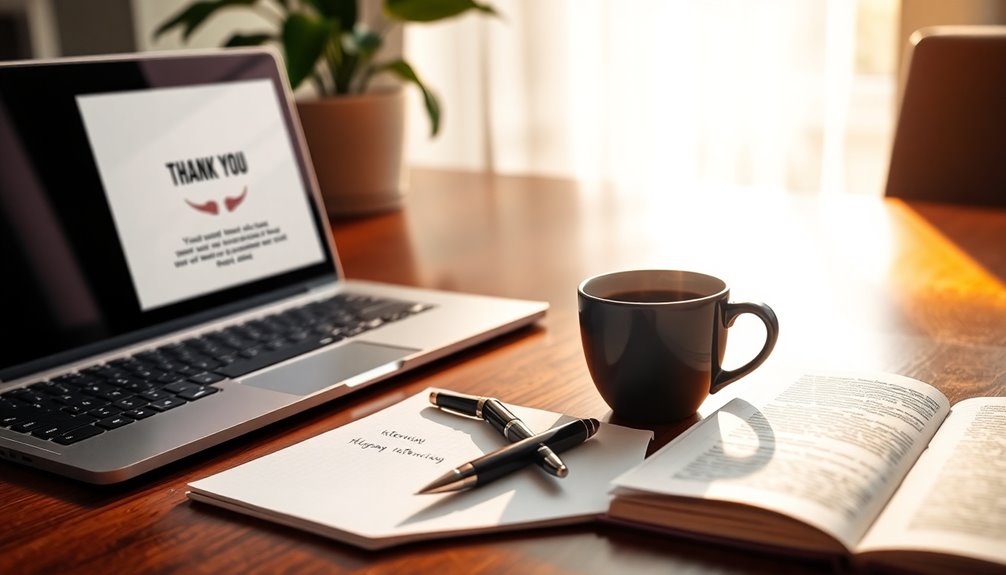
Following up after an interview is essential for making a lasting impression. It demonstrates your professionalism and enthusiasm, showing respect for the interviewer's time and effort.
A well-timed thank-you note can set you apart in a competitive job market, reinforcing positive feelings about your candidacy. Sending this note within 1-2 days is critical; it expresses gratitude while allowing you to reference specific topics discussed during the interview.
This personal touch not only reinforces your interest but also helps keep you top-of-mind as they evaluate candidates. Remember, a thoughtful follow-up can be the difference between you and another applicant, leaving a memorable mark that could influence their decision-making process.
Timing Your Follow-Up
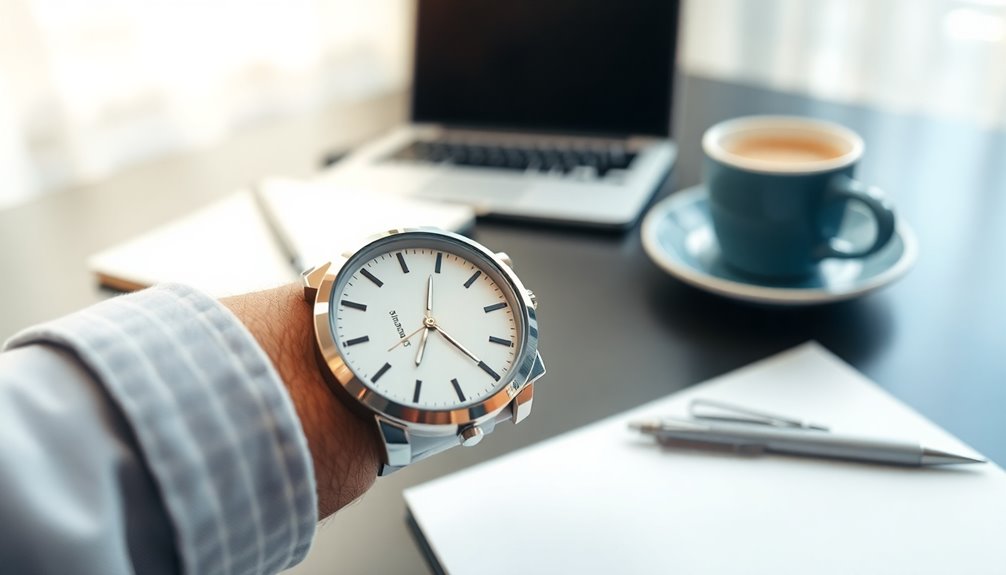
A timely follow-up is key to reinforcing the positive impression you've made during the interview. Sending a thank-you note within 1-2 days shows your professionalism and enthusiasm.
Follow these guidelines to guarantee you're on point with your timing:
- Thank-You Note: Send it within 24-48 hours to express gratitude and reference specific discussions.
- Wait Period: After your thank-you, give it at least five business days before reaching out for updates.
- Respect Their Process: Understand that hiring can take time, and they might be interviewing multiple candidates.
- Be Patient: If you don't hear back immediately, don't panic; it's normal for processes to be delayed.
These steps will help you maintain a positive connection with your potential employer.
Crafting Your Message
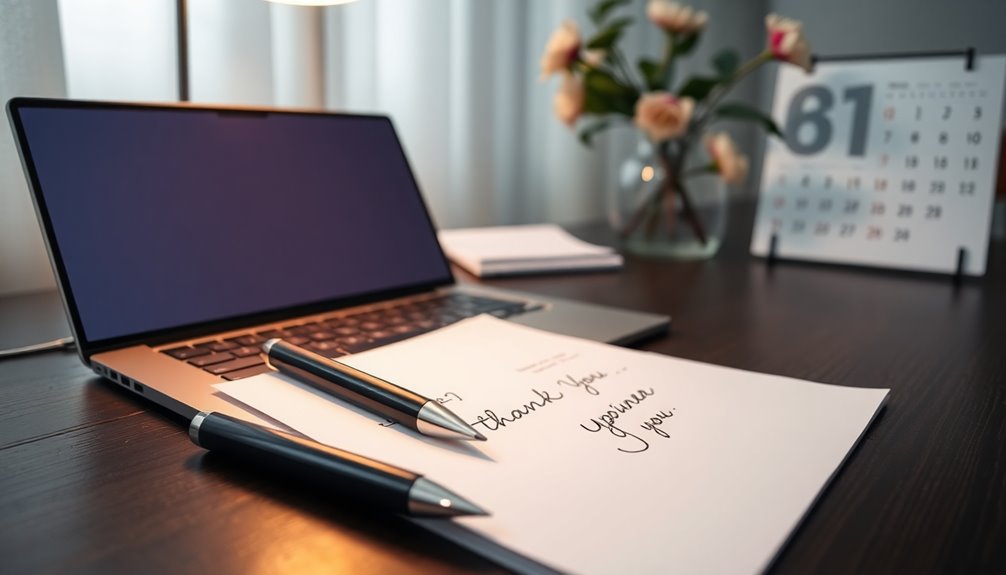
Crafting an effective follow-up message is essential to reinforcing your interest in the position. Start by using a direct subject line that includes the job title, making it easy for the interviewer to recognize your message.
In the body of your email, briefly remind them who you are, mentioning the interview date and specific details discussed. This personal touch shows your attentiveness.
Maintain a positive tone, expressing gratitude and reiterating your excitement about the opportunity. Don't forget to inquire about the next steps in the hiring process.
Keep your message concise and clear, ensuring you respect their time while also highlighting your qualifications. A well-crafted message can leave a lasting impression and keep you top of mind. Additionally, showcasing your strong communication skills can further enhance your follow-up and demonstrate your professionalism.
Best Practices for Thank-You Notes
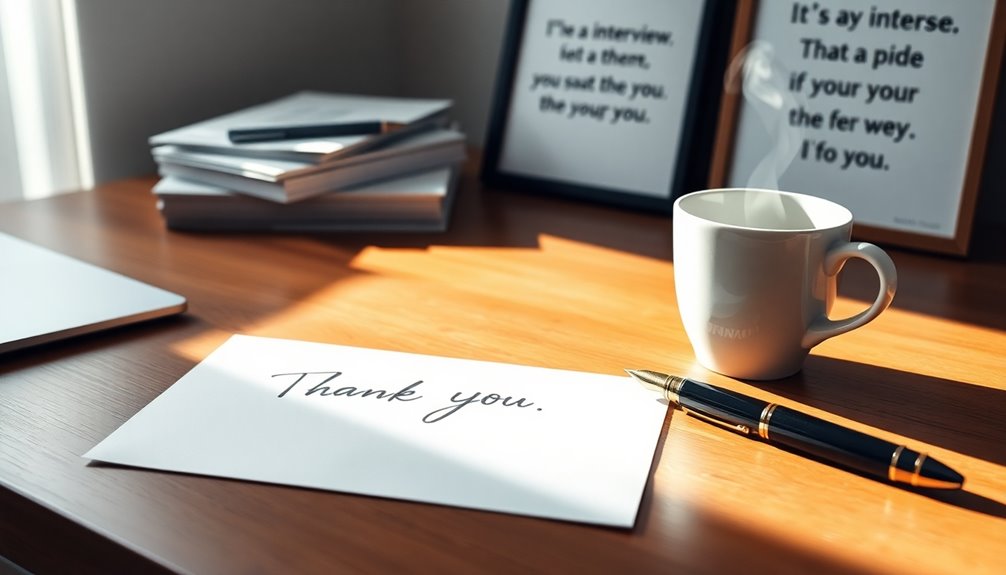
Sending a thoughtful thank-you note after an interview can greatly enhance your chances of making a memorable impression. To guarantee your note stands out, follow these best practices:
- Send it promptly: Aim to send your thank-you note within 24 to 48 hours after the interview.
- Personalize each note: Tailor your message for each interviewer, referencing specific topics from your conversation.
- Keep it concise: Focus on expressing gratitude and reiterating your interest in the position without overwhelming the recipient.
- Proofread before sending: Double-check for any typos or errors, guaranteeing professionalism and clarity in your communication.
Understanding Hiring Delays
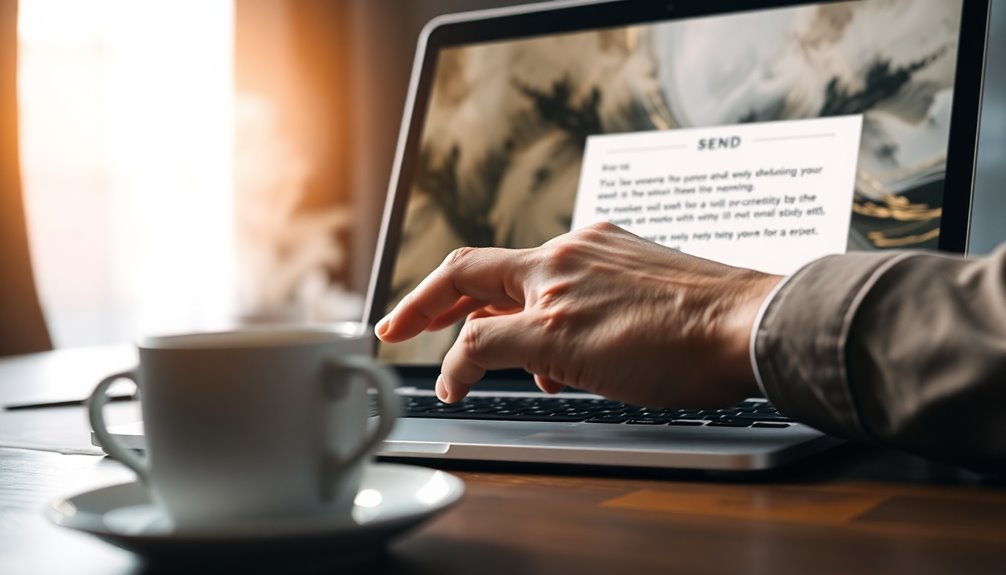
Hiring delays can be frustrating, especially when you're enthusiastic to learn about the next steps in your job search.
It's important to remember that various factors can contribute to these delays. Hiring teams often juggle multiple candidates, which can slow down the evaluation process. Additionally, vacations or unexpected illnesses can disrupt timelines.
Sometimes, confusion within departments can cause further holdups. By understanding these potential hurdles, you can better manage your expectations.
While waiting, it's wise to remain patient and continue exploring other opportunities. Remember, a lack of communication doesn't necessarily reflect your candidacy.
Keeping a positive mindset and a proactive approach can help you navigate this uncertain phase and set the stage for your next career move.
Managing Your Job Search
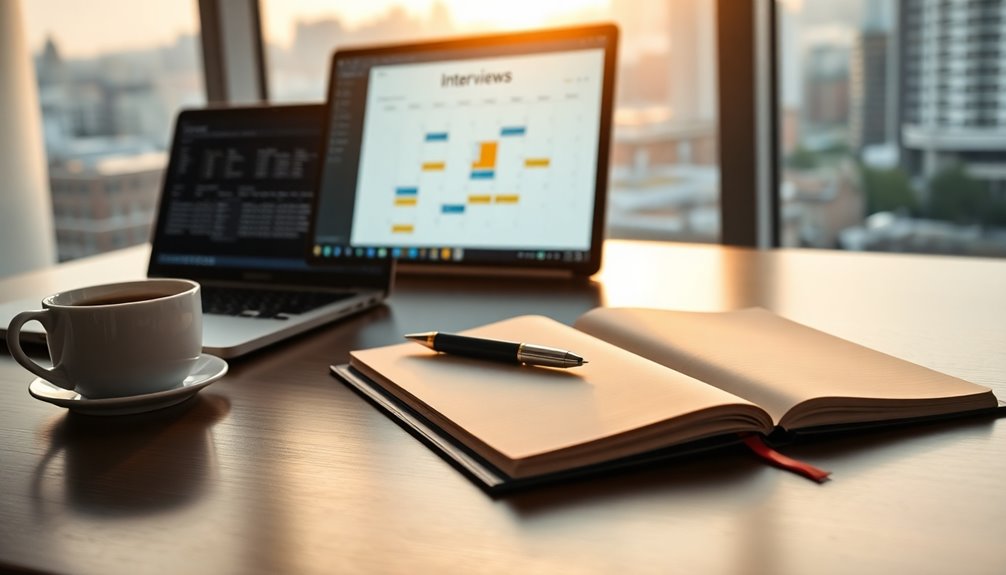
While waiting to hear back from potential employers, it's important to stay proactive in your job search. Here are some strategies to help you manage your search effectively:
- Network Actively: Reach out to your connections and attend industry events. You never know when an opportunity might arise, especially in fields like AI cybersecurity jobs that are rapidly growing.
- Update Your Resume: Keep your resume current and tailored for each job application to make a strong impression.
- Explore Job Boards: Regularly check job boards and company websites for new openings that match your skills and interests.
- Practice Interview Skills: Use this time to refine your interview techniques, ensuring you're ready for any upcoming opportunities.
- Additionally, consider the emotional toll that navigating emotional volatility can have on you during your job search process.
Maintaining Professionalism

Maintaining professionalism throughout the job search process is essential for leaving a lasting impression on potential employers. Always communicate respectfully, whether in emails or during interviews. Use a professional tone and check your messages for clarity and correctness. Additionally, technical SEO principles can provide insights on how to optimize your online presence for potential employers. Necessary cookies help ensure that your online interactions remain secure and functional, enhancing your overall professionalism. Incorporating AI security solutions into your online practices can further protect your personal information during the job search.
When sending follow-up notes, tailor each one to the specific interviewer, mentioning key topics from your conversation. This not only shows your attentiveness but also reinforces your interest in the position.
Be patient and understanding if responses take time; hiring processes can be lengthy and complex.
Finally, remember that professionalism extends to your online presence as well. Guarantee your social media profiles reflect your career aspirations and values, as employers often research candidates beyond the interview stage. Additionally, consider leveraging data-driven insights to inform your follow-up strategy, enhancing your chances of making a positive impression.
Frequently Asked Questions
Can I Follow up More Than Once After an Interview?
You can follow up more than once after an interview, but it's important to do so thoughtfully.
Start with a thank-you note within 1-2 days, then consider a gentle follow-up about a week later if you haven't heard back.
If you still don't receive a response, a final check-in after another week can be appropriate.
Just remember to keep your tone positive and respectful, showing your continued interest without being overly persistent.
What Should I Do if I Don't Receive a Reply?
If you don't receive a reply after your follow-up, don't panic.
It's often best to wait a bit longer, as hiring processes can take time.
If you haven't heard back after a week, you can send a brief, polite email reiterating your interest in the position.
Keep it concise, expressing your enthusiasm to hear about any updates.
Meanwhile, stay proactive and continue exploring other opportunities.
Is It Acceptable to Call Instead of Emailing?
It's generally better to stick with email instead of calling.
Emails give you a chance to articulate your thoughts clearly and allow the recipient to respond at their convenience. A phone call might come off as intrusive, especially if the hiring manager is busy.
If you haven't heard back after a reasonable time, send a polite email to check in. This shows respect for their time while keeping your interest in the position clear.
How Do I Address Multiple Interviewers in a Follow-Up?
When addressing multiple interviewers in your follow-up, start by sending individual notes tailored to each person.
Thank them for their time and mention specific topics you discussed with them.
Use a clear subject line that includes the position title, and make sure to personalize each message.
This approach shows your appreciation and highlights your attention to detail, helping you stand out in their minds as a thoughtful and professional candidate.
Should I Mention Other Job Offers in My Follow-Up?
You shouldn't mention other job offers in your follow-up, as it can come off as desperate or pushy.
Instead, focus on expressing gratitude for the interview and reiterating your interest in the position.
Highlight what excites you about the role and how your skills align with their needs.
This approach keeps the tone positive and professional, ensuring you leave a lasting, favorable impression without introducing unnecessary pressure into the conversation.
Conclusion
In the grand tapestry of your job search, the post-interview follow-up is your golden thread, weaving connection and professionalism into your narrative. By mastering this art, you not only leave a memorable impression but also keep the momentum of your journey alive. Remember, like Odysseus steering through the seas, patience and perseverance will guide you through any delays. Stay proactive, and let each follow-up be a step toward your ultimate destination—a fulfilling career.
Eugene brings a fresh, dynamic voice to our platform as one of our talented Writers. Specializing in research-driven content, he explores the latest findings in psychology and personal growth, translating them into actionable insights for our readers. Eugene’s work is fueled by a curiosity about what makes us tick and a desire to help others unlock their potential.
